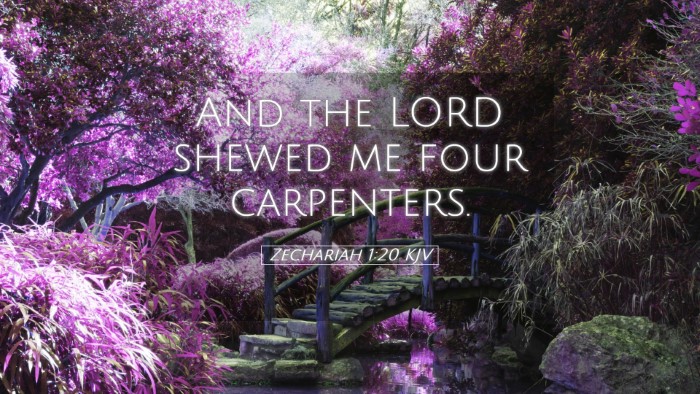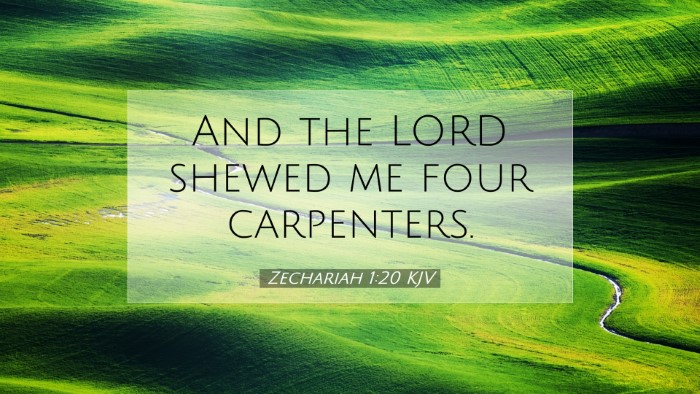Commentary on Zechariah 1:20
Verse Context: Zechariah 1:20 states, “And the Lord showed me four carpenters.” This verse comes in a prophetic context, illustrating God's sovereign plans and the instruments He employs to fulfill His purposes among His people.
Insight from Matthew Henry
Matthew Henry emphasizes the importance of the four carpenters as divine instruments of God’s will. He remarks that these carpenters symbolize the means through which God will bring about restoration and deliverance for His people. Henry notes that the carpenters are contrasted with craftsmen (horns) that have oppressed Israel, indicating a divine reversal. He writes:
"God will make the enemies of His people to be like the horns that are broken: He has appointed means for their destruction, and He will employ them.”
Henry also highlights that the number four is significant, often representing completeness in biblical numerology. He interprets the carpenters as being comprehensive in their ability to dismantle opposition. This symbolism points to God’s overarching sovereignty over all nations and powers, providing hope to the faithful remnant in Judah.
Insight from Albert Barnes
Albert Barnes elaborates on the meaning of the carpenters in the context of Zechariah’s visions. He observes that God discloses the plans that oppose Israel, signifying a protective intervention on behalf of His people. Barnes articulates the metaphor of carpenters as those who skillfully work to shape and create a decisive change:
“These carpenters represent those employed by God to change the very landscape of power and authority, using their divine skill to turn the fortunes of Israel around.”
Furthermore, Barnes sees the carpenters symbolizing various instruments of God's judgment or restoration, which may include spiritual leaders or geopolitical forces that serve God's ultimate purpose. He encourages believers to see the hope in God’s governance and the assurance of His protective measures over those who walk faithfully before Him.
Insight from Adam Clarke
Adam Clarke offers a nuanced perspective on Zechariah 1:20, centering on the metaphorical significance of carpenters. He argues that not only do the carpenters represent divine judgment against Israel’s enemies, but they also act as builders, constructing a future of hope for Israel. Clarke comments:
“The Lord’s carpenters not only destroy but also build: they remove the enemies to establish the new walls of Zion, a spiritual house, and to glorify God among His people.”
Clarke emphasizes that every believer is then called into a role akin to that of a carpenter—working with God in the process of building His kingdom. He sees this depiction as a heavenly encouragement for Israel to engage in their own spiritual renovation, urging them towards repentance and faithful living.
Theological Implications
Together, these insights reflect profound theological implications regarding God’s sovereignty, His means of intervention, and the call for believers to participate in His redemptive work. The imagery of carpenters also challenges readers today to reconsider their own roles in their communities as instruments of God’s purpose. Pastors and theologians can draw on these interpretations to foster a deeper understanding of God’s active involvement in history and personal lives.
Encouragement for Believers
- Hope in God’s Power: Followers of Christ can have confidence that God raises up leaders and forces to aid the Church, assuring them that adversities can and will be overturned.
- Call to Action: Believers are called to be builders of faith, engaging in cultural and spiritual construction against the opposing influences of the world.
- Understanding Divine Justice: The message of Zechariah illustrates God’s justice in a tangible way; He will not allow His people to suffer indefinitely without deliverance.
Conclusion
In summarizing Zechariah 1:20, it becomes clear that the imagery of carpenters represents God’s intervention in the lives of His people and the nations. With contributions from Matthew Henry, Albert Barnes, and Adam Clarke, we find a unified message of hope, action, and divine agency. The community of faith is invited to engage earnestly with this text, discerning their own role as craftsmen of God’s continually unfolding narrative in a world that often seems hostile to His purposes.


